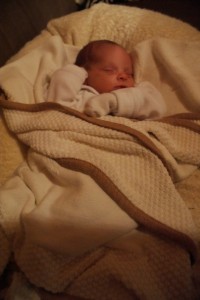Labouring under a false premise
By Khaled Diab
Barring men from the delivery room will not make giving birth any easier. In fact, it is a case of throwing out the father with the bathwater.
14 December 2009

Saturday 28 November was the best birthday I have ever had. The sight of our son, Iskander, breathing his first, after a long and taxing journey for both mother and child, has to count as the single most emotional and moving moment of my life.
The memory of his cries mixing with our tears is one neither my wife nor I are ever likely to forget. But this magical moment, this three-way bonding experience, this blind date with our new life partner is apparently one I shouldn't have savoured, according to French obstetrician Michel Odent, who is against what he bizarrely derides as the “masculinisation of the birth environment”.
The eminent obstetrician even links the rising number of emergency caesarean sections to the presence of fathers in the delivery room. While this, at first sight, appears to be a troubling side effect of our modern lifestyle choices, I find it does not stand up to scrutiny. Pregnancy and birth are complex biological processes and so linking a rise in C-sections to the possible inhibition of oxytocin, also known as the “love hormone”, caused by the presence of a nervous male strikes me as somewhat tenuous.
If this were true, then one would expect fewer emergency C-sections in societies where men are barred or discouraged from attending the birth. But this does not appear to be the case. C-sections, including emergency ones, are on the rise not just in rich, liberal societies, but across the globe, including in China (where men are generally not welcome in the delivery room), Iran (where some husbands have only just been allowed to attend), Saudi Arabia and India.
And what about all those other factors? Surely, one of the reasons why more caesareans are performed is largely thanks to the massive advances in medical technology that have transformed what was once a potentially lethal intervention for the mother to a relatively low-risk life-saver.
In addition, not only can doctors better monitor what goes on during labour for danger signals and react rapidly when they are exhibited, the medical community is rightly averse to putting the lives of the mother or child at undue risk. Also, the increasing levels of obesity are making natural births more difficult, while the growing stature and head size of babies has not really been matched by pelvic size.
My wife was forced to undergo an emergency C-section, but the reason for it had little to do with my presence. It was due to pre-eclampsia and foetal distress caused by a loosening of the placenta, leading our baby's heart rate to fluctuate dangerously, reaching worrying lows.
Had we not been there for each other, the endless, agonising crawl of the clock as the surgeon on weekend call dashed to my wife's aid would have been unbearable torture – Katleen, alone, hearing Iskander's weakening heartbeats and me, outside, wearing away the floor with my apprehension. Instead, we gave each other strength and took it in turns to offer reassurance when one of our spirits flagged.
My presence in the operating theatre was also useful. Katleen, whose anxiety for the baby had completely eclipsed any possible concerns about her own wellbeing, as she admitted to me later, was somewhat reassured by the fact that I could see what the surgeons were doing and could communicate that everything was going okay to her with my eyes.
I was also able to hold the fort while the surgeons performed the more laborious post-op procedures. Instead of our newborn son spending that time in an impersonal neo-natal unit with minimal human contact, I held him to my bare chest to give him some of that essential, reassuring skin contact he needed at the start of his life. In return, he gave me one of the most extraordinary feelings I've ever experienced. When his mother was ready to take him to her breast, the moment was overwhelming for her and for me, out of both joy and relief.
Although Odent may be wrong to link the presence of men in the delivery room with the rising rate of emergency C-sections, he does have a point when he says that nervous dads are a hindrance.
This column appeared in The Guardian Unlimited's Comment is Free section on 12 December 2009. Read the related discussion.



The whole article serves to confirm my view that birthing has been “medicalised”, and that anyone expecting a healthy birth shouldn’t bother going to a hospital.
If ever I have kids (unlikely, lol) I’d strongly consider a home-birth with a …midwife present. As to having the partner present – that varies wildly from person to person, so should be part of the couple’s birthplan, and screw what the doctors think is best – they’re not infallible!
What a shame Odent takes that view – I generally really rate him (his book was invaluable to me when I was pregnant).
Hi Khaled, I’ve just read the Comment is Free post about the birth of your son and want to send all three of you my congratulations. I remember being at the birth of my own first-born – an awesome experience. He’s 22 now… it’s all been a rather awesome experience 🙂 Enjoy. Hope things are good in Brussels(if you are still there). Andrew
Andrew, thanks a lot for your warm wishes! I’ve a long way to go before our Iskander is 22, but I trust and hope that it will be an awe-ful (as in full of awe) experience! 😉